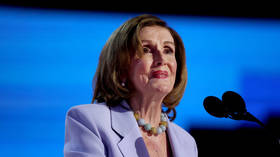UK ‘will not ask’ to extend Brexit transition period despite Covid-19 disruption, says govt spokesperson

A Downing Street spokesperson has reiterated the UK government's determination to go ahead with Brexit as planned, despite the disruptions caused to the ongoing negotiation process by Covid-19.
The current transition period is due to end on December 31 – a date Number 10 is determined to stick to, the prime minister's office said. The spokesperson made it clear that the UK government “will not ask to extend the transition. And, if the EU asks, we will say no.”
The spokesperson added that “extending the transition period would simply prolong the negotiations, prolong business uncertainty, and delay the moment of control of our borders,” all of which the UK government hopes to avoid after leaving the EU.
The UK government position was emphasized in a tweet by its chief Brexit negotiator David Frost, who wrote: "Transition ends on 31 December this year."
As we prepare for the next Rounds of negotiations, I want to reiterate the Government's position on the transition period created following our withdrawal from the EU. Transition ends on 31 December this year.We will not ask to extend it. If the EU asks we will say no. 1/2
— David Frost (@DavidGHFrost) April 16, 2020
The comments come after IMF managing director Kristalina Georgieva urged the UK not to make the current situation "any tougher," and indicated that the fund believes delaying the Brexit transition period could be a good move.
“My advice would be to seek ways in which this element of uncertainty is reduced in the interests of everybody, the UK, the EU, and the whole world,” Georgieva told the BBC.
The global pandemic has severely affected Brexit negotiations, as these can no longer take place in-person and must be done via video conferencing. Moreover, the majority of EU member states are currently preoccupied with curbing the spread of the novel coronavirus domestically, rather than negotiating the terms of a Brexit trade deal.
The UK has itself already asked for several extensions since the referendum on its EU membership was held in June 2016, with the initial date for leaving the EU set to have been on March 19, 2019.
Downing Street has confirmed that three more rounds of talks are now being lined up for the weeks of April 20, May 11 and June 1. Each session is expected to last a week.
Also on rt.com Barnier, Frost back at work as UK & EU agree 3 negotiating rounds for post-Brexit dealLike this story? Share it with a friend!














